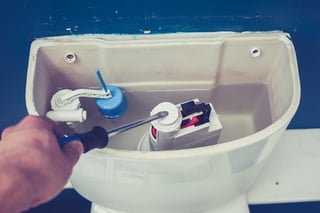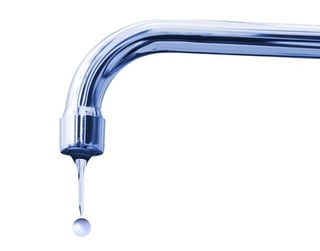 of indoor water use, accounting for 26.7% of consumption in an average home. A leaky toilet can run through up to 200 gallons in a day. That's 1400 gallons a week or 6000 gallons in a month. A three person household typically uses about that much, so a leaky toilet can double your water bill. There are a couple of simple ways to check if your toilet is leaking. First, just listen. If you hear a hissing noise, that's the water entering the toilet tank. If it's doing that constantly that means the water is leaving constantly as well, likely through a faulty flapper at the bottom of the tank. Another way to test for a toilet leak is to put food coloring in the tank. If the color makes its way to the bowl, you have a leak. A new flapper is an easy fix for most people, but if it looks like a different problem or it's one that you don't want to mess with, call a professional plumber. The money you spend will be made up in lower water bills.
of indoor water use, accounting for 26.7% of consumption in an average home. A leaky toilet can run through up to 200 gallons in a day. That's 1400 gallons a week or 6000 gallons in a month. A three person household typically uses about that much, so a leaky toilet can double your water bill. There are a couple of simple ways to check if your toilet is leaking. First, just listen. If you hear a hissing noise, that's the water entering the toilet tank. If it's doing that constantly that means the water is leaving constantly as well, likely through a faulty flapper at the bottom of the tank. Another way to test for a toilet leak is to put food coloring in the tank. If the color makes its way to the bowl, you have a leak. A new flapper is an easy fix for most people, but if it looks like a different problem or it's one that you don't want to mess with, call a professional plumber. The money you spend will be made up in lower water bills. percent of water use per month for a family of three. Double the drip rate is double the water wasted. These are easy to spot, and now that you know they are costing you more money than you think, sometimes easy to fix. Many faucet fixtures can simply be unscrewed and examined. If you find a bad washer, which is usually the culprit, it can be easily replaced. If you are hesitant about messing with your fixtures, it's time to call a professional. Just like with a leaky toilet, fixing a leaky faucet will pay for itself sooner than you think.
percent of water use per month for a family of three. Double the drip rate is double the water wasted. These are easy to spot, and now that you know they are costing you more money than you think, sometimes easy to fix. Many faucet fixtures can simply be unscrewed and examined. If you find a bad washer, which is usually the culprit, it can be easily replaced. If you are hesitant about messing with your fixtures, it's time to call a professional. Just like with a leaky toilet, fixing a leaky faucet will pay for itself sooner than you think.This is another potentially serious issue. A lateral line is a line running from your water main into your home. These pipes can get old, or be affected by tree roots, animal or seismic activity. Whatever the case, it won't take long for a leak like this to get expensive as the water drains into the ground underneath your home. This is another case where the advice of a professional plumber is crucial to finding and fixing the problem. This is an issue that can't be ignored.
If you don't have any of these problems and would like to reduce your water bill, here are some things you should stop doing.
Using top-loading washing machines. Front loading models use up to 200% less water
Washing less than full loads
Keeping the water running while shaving or brushing your teeth
Washing dishes by hand with the water running
Taking showers longer than five or ten minutes
Overwatering your lawn
Visit our Plumbing Page for tips.


